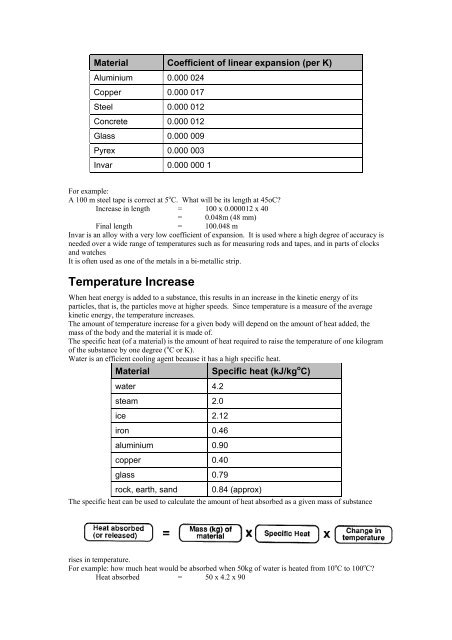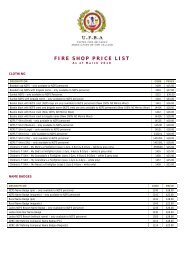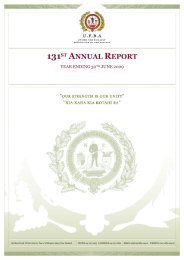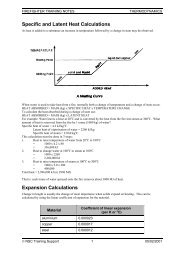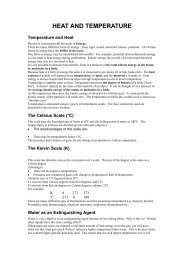THE EFFECTS OF HEAT ON MATTER
THE EFFECTS OF HEAT ON MATTER
THE EFFECTS OF HEAT ON MATTER
You also want an ePaper? Increase the reach of your titles
YUMPU automatically turns print PDFs into web optimized ePapers that Google loves.
Material Coefficient of linear expansion (per K)<br />
Aluminium 0.000 024<br />
Copper 0.000 017<br />
Steel 0.000 012<br />
Concrete 0.000 012<br />
Glass 0.000 009<br />
Pyrex 0.000 003<br />
Invar 0.000 000 1<br />
For example:<br />
A 100 m steel tape is correct at 5 o C. What will be its length at 45oC?<br />
Increase in length = 100 x 0.000012 x 40<br />
= 0.048m (48 mm)<br />
Final length = 100.048 m<br />
Invar is an alloy with a very low coefficient of expansion. It is used where a high degree of accuracy is<br />
needed over a wide range of temperatures such as for measuring rods and tapes, and in parts of clocks<br />
and watches<br />
It is often used as one of the metals in a bi-metallic strip.<br />
Temperature Increase<br />
When heat energy is added to a substance, this results in an increase in the kinetic energy of its<br />
particles, that is, the particles move at higher speeds. Since temperature is a measure of the average<br />
kinetic energy, the temperature increases.<br />
The amount of temperature increase for a given body will depend on the amount of heat added, the<br />
mass of the body and the material it is made of.<br />
The specific heat (of a material) is the amount of heat required to raise the temperature of one kilogram<br />
of the substance by one degree ( o C or K).<br />
Water is an efficient cooling agent because it has a high specific heat.<br />
Material Specific heat (kJ/kg o C)<br />
water 4.2<br />
steam 2.0<br />
ice 2.12<br />
iron 0.46<br />
aluminium 0.90<br />
copper 0.40<br />
glass 0.79<br />
rock, earth, sand<br />
0.84 (approx)<br />
The specific heat can be used to calculate the amount of heat absorbed as a given mass of substance<br />
rises in temperature.<br />
For example: how much heat would be absorbed when 50kg of water is heated from 10 o C to 100 o C?<br />
Heat absorbed = 50 x 4.2 x 90


